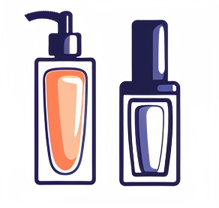The best natural shampoo for oily hair revealed
One key ingredient to look for in natural shampoos for oily hair is tea tree oil. This potent essential oil has antibacterial and antifungal properties that help to combat the bacteria and fungi that contribute to oily scalp and hair. Additionally, tea tree oil has a refreshing and invigorating scent, leaving your hair feeling clean and revitalized.
Another beneficial ingredient to consider is witch hazel. Witch hazel is a natural astringent that can help to remove excess oil from the scalp and hair follicles, leaving your hair looking and feeling less greasy. It also has soothing properties that can help to calm inflammation and irritation on the scalp.
Lemon is also a popular ingredient in natural shampoos for oily hair. Lemon has antimicrobial properties that can help to cleanse the scalp and regulate oil production. It also has citric acid, which can help to remove buildup and residue from styling products and hard water.
For those with oily hair, it’s important to avoid shampoos that contain harsh sulfates and silicones, as these ingredients can strip away too much oil, leading to overproduction in the long run. Instead, opt for natural shampoos that are sulfate-free and formulated with gentle surfactants derived from coconut or sugar.
To help you find the perfect natural shampoo for your oily hair, here’s a comparison table highlighting some popular options:
| Brand | Key Ingredients | Benefits |
|---|---|---|
| 1. Tea Tree Therapy Shampoo | Tea Tree Oil, Peppermint Oil | Antibacterial, Refreshing |
| 2. Avalon Organics Lemon Clarifying Shampoo | Lemon, Aloe, Chamomile | Clarifying, Soothing |
| 3. Maple Holistics Degrease Shampoo | Lemon, Basil, Rosemary | Degreasing, Balancing |
The magic of clarifying wash for oily scalp
Clarifying wash for oily scalp is like a magic potion for those battling the eternal struggle against excess oil production. Picture this: you wake up, and your scalp feels like it’s been marinating in olive oil overnight. Not the most pleasant sensation, right? That’s where the magic of clarifying wash swoops in to save the day.
So, what exactly makes clarifying wash so enchanting? It’s all about the ingredients. Unlike regular shampoos that merely cleanse the surface, clarifying wash delves deep into your scalp’s mysterious realms, banishing excess oil and impurities with its potent blend of clarifying agents. These agents, often containing ingredients like salicylic acid or tea tree oil, work their sorcery to unclog hair follicles and balance sebum production.
But hold your horses, because there’s more to this tale. Clarifying wash isn’t just about banishing oil; it’s also a tale of rejuvenation and revival. Imagine your scalp as a garden parched by drought, and clarifying wash as the rain that brings it back to life. With each wash, your scalp is invigorated, revitalized, ready to face the day with newfound vigor.
Now, let’s talk about the how. Using clarifying wash isn’t rocket science, but it does require a gentle touch. Massage it into your scalp with circular motions, allowing the potion to work its magic for a few minutes before rinsing thoroughly. Ah, the sensation of purity cascading down your strands!
But beware, dear reader, for every magic comes with its cautionary tale. While clarifying wash is a hero for oily scalps, it can be a villain for those with dry or sensitive skin. Like a double-edged sword, its clarifying prowess may strip away natural oils, leaving your scalp barren and vulnerable.
Discovering oil control herbal shampoo
Discovering oil control herbal shampoo:
In recent years, the quest for natural solutions to common hair care concerns has led to the discovery of oil control herbal shampoo, a revolutionary product that addresses the needs of individuals struggling with oily scalp and hair.
Traditional shampoos often contain harsh chemicals that strip the scalp of its natural oils, leading to overproduction of sebum and exacerbating the problem of greasy hair. However, oil control herbal shampoo takes a different approach by harnessing the power of nature to balance oil production while nourishing the scalp and hair follicles.
One of the key ingredients found in oil control herbal shampoo is rosemary extract, which has long been revered for its ability to regulate sebum production. Rosemary contains antioxidants and antimicrobial properties that help cleanse the scalp of excess oil and impurities without causing dryness.
Another potent botanical ingredient in oil control herbal shampoo is tea tree oil, renowned for its antibacterial and antifungal properties. Tea tree oil helps to unclog hair follicles and reduce inflammation, making it an effective remedy for oily scalp conditions such as dandruff and scalp acne.
Additionally, witch hazel extract is often included in oil control herbal shampoo for its astringent properties. Witch hazel helps to tighten the pores on the scalp, reducing the production of excess oil and preventing buildup that can lead to greasy hair.
One of the advantages of using oil control herbal shampoo is its gentle yet effective formula, which is suitable for all hair types, including sensitive scalps. Unlike harsh chemical-laden shampoos, oil control herbal shampoo is free from sulfates, parabens, and artificial fragrances, making it a safer and more sustainable choice for both your hair and the environment.
Furthermore, the natural botanicals present in oil control herbal shampoo not only help to control oiliness but also promote overall scalp health and hair growth. By nourishing the scalp with essential vitamins and minerals, oil control herbal shampoo strengthens the hair follicles and reduces hair fall, resulting in thicker, healthier-looking hair over time.
Ingredients to look for in natural shampoo for oily hair
When it comes to selecting a natural shampoo for oily hair, it’s crucial to pay attention to the ingredients that make up the formula. The right combination can help balance oil production, cleanse the scalp, and leave your locks feeling refreshed. Here are some key ingredients to look for:
1. Tea Tree Oil: Known for its antibacterial and antifungal properties, tea tree oil helps combat excess oil and soothes an irritated scalp. Look for shampoos containing a moderate concentration of tea tree oil to effectively manage oiliness without causing dryness.
2. Peppermint: Peppermint oil is invigorating and has a cooling effect, making it an excellent choice for oily scalps. It helps control oil production while providing a refreshing sensation. Shampoos with peppermint can leave your hair feeling clean and revitalized.
3. Aloe Vera: Aloe vera is renowned for its soothing and hydrating properties. In a shampoo, it can help balance moisture levels on the scalp, preventing it from overproducing oil to compensate for dryness. Aloe vera is also gentle, making it suitable for frequent use.
4. Lemon or Citrus Extracts: Lemon and citrus extracts are natural astringents that can cut through excess oil and leave your hair with a fresh scent. Shampoos containing these extracts can help clarify the scalp and provide a lightweight feel to the hair.
5. Clay: Clay-based shampoos are excellent for absorbing excess oil and impurities. Ingredients like kaolin or bentonite clay cleanse the scalp without stripping it of essential moisture. These shampoos are particularly effective for those with extremely oily hair.
6. Chamomile: Chamomile has anti-inflammatory properties that can soothe an irritated scalp. It also helps regulate oil production, making it a suitable ingredient for natural shampoos designed for oily hair. Chamomile-infused shampoos can add shine without weighing the hair down.
7. Green Tea: Rich in antioxidants, green tea can promote a healthy scalp by reducing excess oil and minimizing inflammation. Shampoos with green tea extracts can offer a refreshing cleanse while contributing to overall scalp health.
8. Protein: While not a botanical ingredient, adding protein to your shampoo can strengthen the hair and prevent it from becoming overly oily. Look for shampoos containing proteins like keratin or soy, as they help maintain a balanced scalp environment.
How to balance your scalp’s natural oils
One of the keys to maintaining healthy hair is to balance your scalp’s natural oils. These oils, known as sebum, are produced by the sebaceous glands and are essential for keeping your scalp moisturized and your hair nourished. However, an imbalance in sebum production can lead to various scalp issues, including dandruff, greasiness, and dryness.
To achieve optimal balance, it’s crucial to understand your scalp type. Some individuals have scalps that produce excessive sebum, while others have dry scalps that lack sufficient oil. Determining your scalp type will help you tailor your hair care routine accordingly.
Here are some tips to help you balance your scalp’s natural oils:
| Tip | Description |
| Use a gentle shampoo | Opt for a mild, sulfate-free shampoo that won’t strip your scalp of its natural oils. Washing your hair too frequently or using harsh products can disrupt the oil balance. |
| Avoid overwashing | While it’s essential to keep your scalp clean, overwashing can stimulate the sebaceous glands to produce more oil. Aim to wash your hair no more than 2-3 times a week. |
| Try scalp massage | Massaging your scalp stimulates blood circulation and helps distribute the natural oils evenly. Use your fingertips to massage your scalp gently while shampooing or apply oil and massage before washing. |
| Use oil-balancing hair masks | Clay or charcoal-based hair masks can help absorb excess oil from the scalp, while hydrating masks containing ingredients like aloe vera or honey can nourish and moisturize dry scalps. |
| Adjust your diet | Eat a balanced diet rich in essential fatty acids, vitamins, and minerals to support overall scalp health. Foods like salmon, avocados, nuts, and leafy greens can promote healthy oil production. |
Additionally, consider incorporating scalp-friendly ingredients into your hair care routine. Look for products containing tea tree oil, peppermint, rosemary, or salicylic acid, which can help regulate oil production and maintain a healthy scalp environment.
The role of diet and lifestyle in managing oily hair
Oily hair can be a frustrating problem, often leading to a greasy and unkempt appearance. However, managing oily hair is not an insurmountable task. Diet and lifestyle changes can play a significant role in controlling excess oil production and promoting healthier hair.
Dietary adjustments can make a noticeable difference in the condition of your hair. Opt for a balanced diet rich in nutrient-dense foods such as fruits, vegetables, lean proteins, and whole grains. These foods provide essential vitamins and minerals that promote overall hair health and regulate oil production.
Additionally, hydration is key to maintaining healthy hair and scalp. Drinking an adequate amount of water helps to flush out toxins from the body and keep the scalp hydrated, preventing excessive oiliness.
Incorporating omega-3 fatty acids into your diet can also be beneficial for managing oily hair. Sources of omega-3s include fatty fish like salmon, flaxseeds, and walnuts. These healthy fats help to regulate sebum production and promote a balanced scalp environment.
On the other hand, certain foods can exacerbate oily hair. Processed foods, high-sugar and high-fat items, and excessive dairy can contribute to increased oil production. Limiting these foods in your diet may help alleviate oily hair.
Aside from diet, lifestyle choices can also impact the condition of your hair. Stress management techniques such as yoga, meditation, or deep breathing exercises can help reduce cortisol levels, which can in turn decrease oil production.
Regular exercise is not only beneficial for overall health but can also improve hair quality. Physical activity increases blood flow to the scalp, delivering nutrients and oxygen to the hair follicles while promoting a healthy balance of oils.
Proper hair care is essential for managing oily hair. Use mild, sulfate-free shampoos to cleanse the scalp without stripping away natural oils excessively. Avoid overwashing, as this can stimulate the scalp to produce more oil.
When styling your hair, opt for lightweight, oil-free products and avoid heavy styling creams or serums that can weigh down the hair and contribute to greasiness.
Diy remedies and tips for oily hair management
If you find yourself grappling with the constant battle against oily hair, fret not – there are several DIY remedies and tips that can help you regain control over those unruly locks. Managing oily hair requires a combination of proper cleansing, nourishing treatments, and lifestyle adjustments.
Firstly, it’s crucial to choose the right shampoo. Opt for a clarifying shampoo that effectively removes excess oil without stripping your hair of essential moisture. Look for products containing ingredients like tea tree oil or witch hazel, known for their astringent properties that help balance oil production.
Consider incorporating a homemade hair mask into your routine. A clay mask made with bentonite or kaolin clay can absorb excess oil and impurities from the scalp. Mix it with apple cider vinegar for its clarifying effect. Apply the mask once a week for optimal results.
Hydration is key, even for oily hair. Use a lightweight conditioner specifically formulated for oily hair types. Apply it primarily to the ends of your hair to avoid overburdening the scalp. Additionally, try a DIY hair rinse with diluted lemon juice or green tea – both known for their astringent properties.
Adjust your hair washing frequency to prevent your scalp from overproducing oil. While it may be tempting to wash oily hair daily, doing so can strip away natural oils, triggering an increase in oil production. Aim for every other day or as needed based on your hair’s response.
Explore the benefits of essential oils in your hair care routine. Tea tree oil, rosemary oil, and lavender oil possess antimicrobial properties that can help control oiliness and soothe the scalp. Mix a few drops with a carrier oil and massage it into your scalp.
Diet and lifestyle play a role in managing oily hair. A balanced diet rich in omega-3 fatty acids can promote scalp health. Additionally, avoid excessive heat styling, as it can stimulate oil production. Instead, opt for hairstyles that keep hair off your face.
For those on the go, dry shampoo becomes a handy companion. It absorbs excess oil, adds volume, and refreshes your hair between washes. Keep a travel-sized bottle in your bag for quick touch-ups throughout the day.







